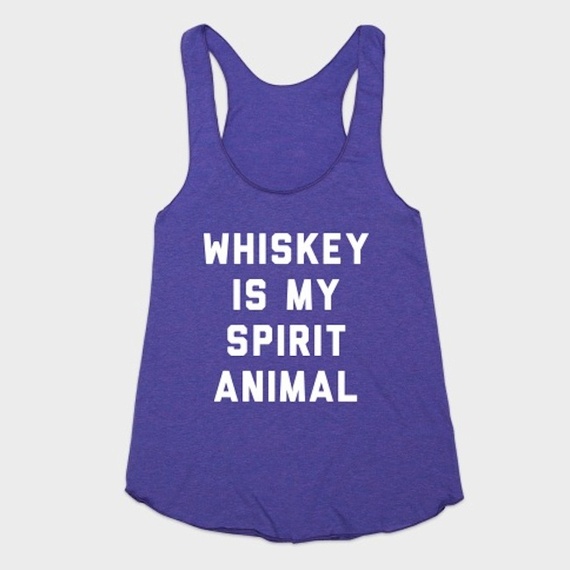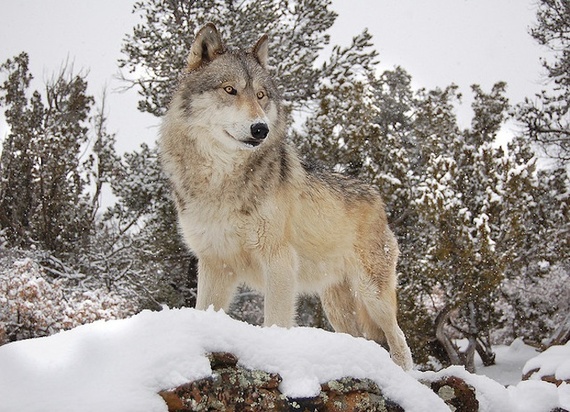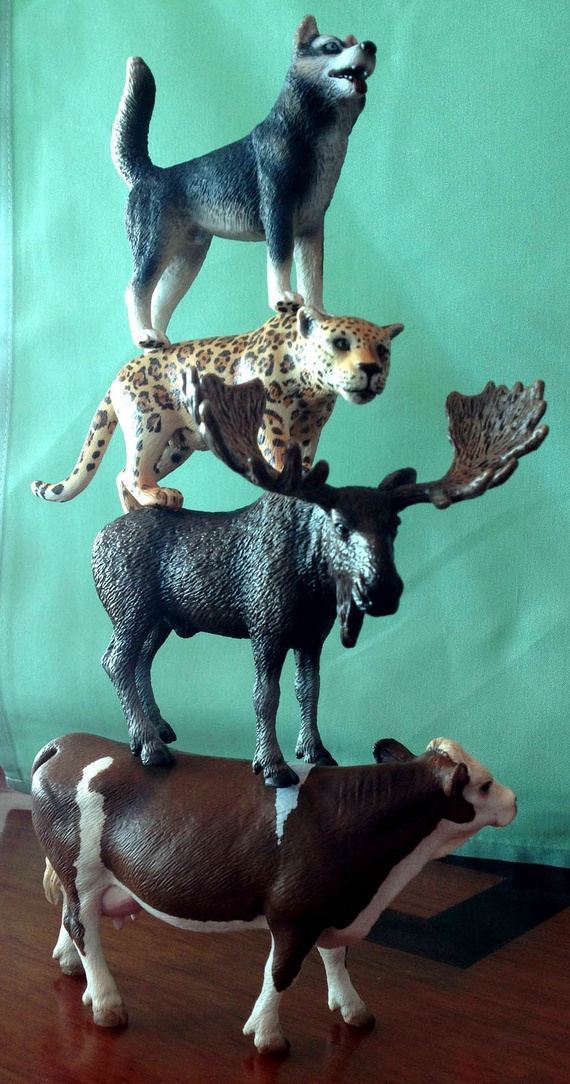What is your spirit animal? Is it the manatee? Is it the snow leopard? Is it Beyoncé perched upon a bear in the manner of Vladimir Putin? Perhaps it is the goldendoodle (because you are friendly and sassy and possibly hypoallergenic). Or the honey badger (self-explanatory). Or the spork.
Perhaps you are lucky enough to have a single spirit animal. Or perhaps you have many spirit animals, depending on your mood and circumstance. Perhaps you are in between spirit animals at the moment. Or perhaps you have never had one, having understandably fallen victim to the paradox of spirit animal choice.
There are, after all, so many spirit animal options out there, across so many spirit animal categories! If you take the Internet as your spiritual guide, your spirit animal could be another person (Elizabeth Warren, Jennifer Lawrence, Lana del Rey, Stevie Nicks, Bea Arthur), a fake person (Ron Swanson, Nick Miller, Rayanne Graff, Sansa Stark, Liz Lemon), or a fake semi-person (Lisa Simpson). It could be a food (the pizza, the fried green tomato grilled cheese sandwich, the epic Chipotle burrito you had for lunch the other day). It could be an actual animal (the dolphin, the corgi, the sloth, the Geico camel). It could be a Disney princess. It could be Grumpy Cat. It could be science. It could be whiskey.

As a rhetorical device, the spirit animal—the person or thing you appreciate by claiming it as your own—is not new. The deep desire to tell other people who we are by way of the things around us—this has, throughout the ages, driven art and fashion and poetry. Prufrock and his peach. Whitman, singing the song of himself. Dickinson. Ellison. Poehler. The Geico camel. They give us stuff to talk about, but they also give us stuff to relate to. To like the products of culture—and, now, to Like them—isn't just a matter of taste; it's also a matter of identity.
The spirit animal, on the Internet, reduces all that human nuance to ironic absurdity, with the help of the media's identity-industrial complex. All those stories informing you that "this dog howling in protest at an alarm clock is your spirit animal." All those quizzes offering to help you find your spirit animal (and then to help you share your results on Facebook so that others can find theirs, too). The New York Observer features a daily (well, semi-daily) spirit animal, with recent selections including Garfield, the ducks from The Sopranos, and Waldo, the myna bird from Twin Peaks. Vogue includes "what is your spirit animal?" in the "73 Questions" it asks its celebrity interviewees. Justin Timberlake's spirit animal, YouTube would like to remind us, is a monkey.
* * *
The concept of the spirit animal comes, most directly, from Native American spirituality. In that tradition, though there are variations across tribes and cultures, the spirit animal—otherwise known as a "totem animal"—generally takes the form of a single animal with which a person or a clan shares a certain set of characteristics, and therefore a kinship. The animal acts as a guide and protector for humans. In death, the humans' spirits are absorbed into the animal.
The Internet—whose principal spirit animals include Taylor Swift, Jonathan Swift, and the KFC Double Down—has taken that metaphysical tradition and turned it into LOLs. That transformation happened gradually, and then quickly. As the Internet librarian Amanda Brennan told me, news groups and chat boards dedicated to wiccanism, paganism, and shamanism discussed sprit animals—unironically—in the 1990s. By the mid-2000s, personality quizzes offering to help people find their spirit animals began emerging. These were also earnest.

The first ironic use of "spirit animal" may date back to August 2006, on one of the Shroomery.org message boards. As Brennan put it in an email,
While the thread began as an honest inquiry into animals people have formed bonds with through tripping, the user weathereporter88 claimed their spirit animal was Samuel Jackson. This one-off comment was not acknowledged by the other posters. This usage appeared online again in October 2007, when a blogger from This Recording asserted the Mad Men character Peggy Olsen was their spirit animal for being "off the hook awesome."
So, yep: Samuel L. Jackson may have been the first of the Internet's spirit animals. Peggy Olson may have been the second.
The rise of Tumblr—for which Brennan now serves as content and community manager—may well have contributed to the virality of "spirit animal" as a conceptual meme. Tumblr is image-focused; its liking and re-blogging features—not to mention its tagging capabilities—also mean that content can be shared easily and quickly on its platform. Tumblr is also, of course, irony-friendly. And it is one of the foundational pieces of infrastructure when it comes to the Internet's identity-expressive capabilities.

Kate Miltner, a Ph.D student at USC and a researcher of Internet culture, points out that "spirit animal," as a tag or a comment, is often used as a two-word punchline to reaction GIFs. Indeed, one of the earliest instances of "spirit animal" on Tumblr, Brennan told me, came in October 2010, when the user katpocket reblogged a GIF from the TV show Skins with the tag "Effy is my Spirit Animal." (This was meant, ostensibly, to emphasize her affinity for the character Effy Stonem.) And then, in November of 2010—in a New York Times article—the author Mary H.K. Choi praised her moving man for the fact that, despite her multiple moves throughout the city, he had not judged her. She called him, yep, her "spirit animal."
By December of 2010, "spirit animal" had taken enough hold on the Internet to earn a mention on Urban Dictionary. "Online,” the unusually straightforward entry puts it, “saying something or someone is your spirit animal is a statement that said person or thing is a representation of you or what you want to be."
There is no mention, in this entry, of the spirit animal's roots in Native American tradition. But the connection, of course, remains. Last month, the University of Montana, in response to protests from Native American student groups, passed a resolution against the asking of "what is your spirit animal?" in orientations and other meetings. The school cited "institutional racism" and "a need for greater cultural awareness" as causes for the change.
As the Tumblr user garconniere summed it up back in 2011:
yes, i am really uncomfortable with how often people say “person x is my spirit animal" or just randomly tag things "spirit animal" without thinking about it. for the longest time i didn’t get what it even was supposed to mean… just look at the tag on tumblr and you see hockey players, fictional characters, movie stars, “hipster animals" and hey! even a few animals. it has come to my attention that it is trendy to throw a "spirit animal" theme party. (for the record, this is just dressing up as animals)
just take a second, step back and think about it before you throw around a term like spirit animal. is there a better way of saying what you’re actually trying to convey? if you’re talking about a person, could you say, “i have a lot of admiration for you/we’re kindred spirits/you’re my brother from another mother/sister from another mister?” if you’re throwing a theme party, could you just throw an… animal themed party?
You could. But most casual Internet-ers wouldn't think of it, because most don't think of the spirit animal—the conceptual meme—as an appropriation. Most of us think of the term simply as a shorthand, one that is well-suited to a web culture that has been thoroughly influenced by Facebook and Tumblr and other social media. And one that has also been, at this point, thoroughly commercialized.
As The Toast recently summed things up in its glossary of the Internet: "spirit animal: here’s something I like; I am not familiar with what a spirit animal is or does."
The Internet, like nature, abhors a vacuum, and "spirit animal" revealed a need: to take all the cultural products—people, things, ideas—that are pinging around on our screens and organize them and categorize them and express our appreciation for them. As the Internet's infrastructure built itself around identity expression—all those status updates and Likes and Instagrams and Vines, all those tweets and Tinder profiles and blog posts and Snapchats—the concept offered an easy way for people to share their affinities and aspirations, all with the conveniently low stakes of irony. As Miltner puts it, "Referring to a (human) celebrity or character as a 'spirit animal' brings in both the ironic and the performative, and irony and performance are core, animating features of Internet culture."
This article was originally published at http://www.theatlantic.com/technology/archive/2014/11/your-spirit-animal-a-cultural-investigation/382369/
